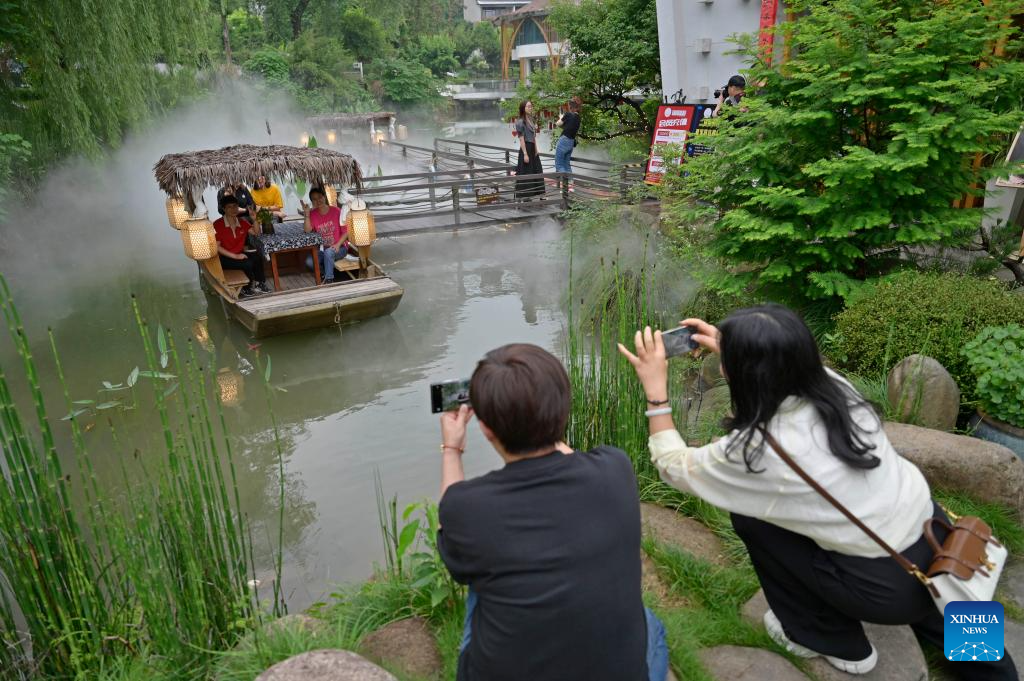Transforming hollow village into thriving tourist destination

This aerial photo shows a view of Hengshanwu Village in Anji County, east China's Zhejiang Province, June 5, 2023. (Xinhua/Cai Yang)
HANGZHOU, July 3 (Xinhua) -- About 20 years ago, the architect Chen Gu returned to his hometown to prepare to start a business, but instead took over a project to renovate a hollow village administered by Hengshanwu Village in Anji County, east China's Zhejiang Province.
Hengshanwu was at the time a poor village with a deteriorating environment due to mining activities. The local vegetation was destroyed and the sewage ditches gave off a foul smell. As a result, most locals chose to move away.
"Previously, I had to carry my bicycle on my shoulder to walk back to the village on rainy days because of the muddy dirt roads here," said Cai Mingfu, Party chief of Hengshanwu Village.
The village saw a turning point in 2003, when Zhejiang launched the Green Rural Revival Program, which involved renovating about 10,000 incorporated villages and transforming about 1,000 central villages among them into examples of moderate prosperity in all respects. Thanks to the program, the village started a campaign of rural renovation and construction, and made significant improvements in hardening its roads, waste collection and dredging its river ditches in the following years.
With a brand-new look, Hengshanwu Village began vigorously developing its tourism economy based on its superior nature resources. Local authorities invited the Anji native Chen to help build the once hollow village into a tourist community.
"I grew up in the mountains here and wanted to create a modern, earthy countryside," the 52-year-old experienced architect said.
Chen spent years on the overall planning and landscape design of the village, as well as the renovation and decoration of the local dwellings. On the basis of preserving the original appearance of the village, he created a cluster of homestays in Hengshanwu and named the area "Xiaoyin" in Chinese, meaning an "escape" from the city.
Locals can rent their houses to Chen's professional management team, or they can run the homestays by themselves. "We don't want to drive the people away, but to do a good job in the rural cultural tourism industry and achieve common prosperity together," Chen said.
Before construction began, Chen developed a cultural theme and style for each homestay according to the personality and areas of expertise of the host. In 2019, the homestay area officially began operations.
"We focus on differentiation and have built 19 homestays with different styles, such as traditional Chinese and Japanese styles," Chen said. The homestays also have varied themes such as parenting, tea, reading and mountains. There are also facilities such as a library, restaurants, coffee and dessert shops, bars and artist studios in the area.
In 2022, Xiaoyin became a popular spot for social media users, receiving more than 350,000 visitors, bringing in an annual revenue of over 67 million yuan (about 9.29 million U.S. dollars). Its average daily turnover was more than 40,000 yuan during the May Day holiday this year.
"We believe the greatest luxury in the future will be rural life," Chen said.
Anji native Huang Dong, 45, brought his restaurant chain, Huang Mama's Cuisine, to Xiaoyin in 2018. After its environmental and service upgrades, the mist-shrouded, garden-style restaurant has attracted plenty of diners from afar.
"Although our restaurant is in a village, the per capita consumption of customers can reach about 200 yuan, and it is often full during holidays," Huang said.
Even through the COVID-19 pandemic, the restaurant maintained an average annual revenue of about 20 million yuan. "Our revenue is expected to hit about 25 million yuan this year," Huang said.
He said the success of the restaurant is inseparable from the village's excellent business environment. The local government not only provides policy support for enterprises, but also helps to dispose of waste and carry out regional greening work. As one of the major businesses in the area, Huang's restaurant also receives a subsidy of 300,000 yuan from the government every year.
"We can really feel that the government is serving the business, and it gives us a lot of autonomy. But for us, we have more pressure and build the area like home," Huang said.
In 2022, the tourism revenue of Hengshanwu Village was 108 million yuan, and the per capita net income of locals exceeded 55,000 yuan.
"The biggest change brought about by the Green Rural Revival Program was the uniting of people's hearts. When people are united and full of vigor, the road to common prosperity becomes wider and wider," Cai said.?

Tourists take photos at a restaurant in Hengshanwu Village in Anji County, east China's Zhejiang Province, June 5, 2023. (Xinhua/Cai Yang)
Photos
Related Stories
- Infographics: Green Rural Revival Program drives remarkable transformation in Zhejiang
- Village witnesses ongoing growth of homestays in E China's Zhejiang
- Strolling back in time through Guangzhou's ancient village
- Villages in Guangxi explore new models to develop village cooperatives
- Village in rural China ensures elderly a richer cultural life
- Ancient village in N China embraces new vitality
- Tearful villagers bid farewell to a local official
- Agriculture heritage system revives China's "United Nations village"
- Rice and fish harvested together: A unique scene in China
- Feature: South China fishing village thrives through surfing
Copyright © 2023 People's Daily Online. All Rights Reserved.









